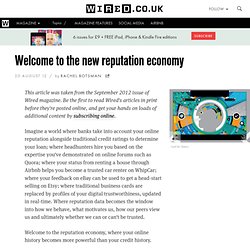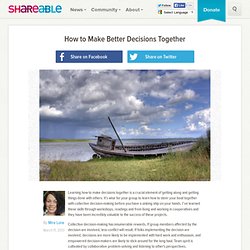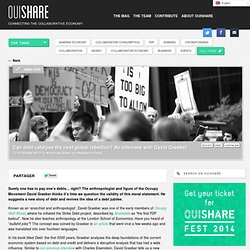

Peer.ccsd.cnrs.fr/docs/00/57/11/32/PDF/PEER_stage2_10.1177%252F0963662507079371.pdf. Www.iap2.org/associations/4748/files/Journal_10January_Vol4_No1_6_Hilgers%26Ihl_Citizensourcing.pdf. Be a Trustman ! Welcome to the new reputation economy. This article was taken from the September 2012 issue of Wired magazine.

Be the first to read Wired's articles in print before they're posted online, and get your hands on loads of additional content by subscribing online. Imagine a world where banks take into account your online reputation alongside traditional credit ratings to determine your loan; where headhunters hire you based on the expertise you've demonstrated on online forums such as Quora; where your status from renting a house through Airbnb helps you become a trusted car renter on WhipCar; where your feedback on eBay can be used to get a head-start selling on Etsy; where traditional business cards are replaced by profiles of your digital trustworthiness, updated in real-time. Where reputation data becomes the window into how we behave, what motivates us, how our peers view us and ultimately whether we can or can't be trusted. In September 2008, Atwood and Spolsky launched Stack Overflow. How to Make Better Decisions Together. Learning how to make decisions together is a crucial element of getting along and getting things done with others.

It’s wise for your group to learn how to steer your boat together with collective decision-making before you have a sinking ship on your hands. I’ve learned these skills through workshops, readings and from living and working in cooperatives and they have been incredibly valuable to the success of these projects. Collective decision-making has innumerable rewards. If group members affected by the decision are involved, less conflict will result. If folks implementing the decision are involved, decisions are more likely to be implemented with hard work and enthusiasm, and empowered decision-makers are likely to stick around for the long haul. A strong example of collective decision-making is participatory budgeting which often leads to less contentious, more inclusive budgetary decisions – not an easy challenge. Consensus flowchart by Grant Horwood Group Mind Facilitation. "The ideology of debt is a powerful tool to justify violent inequalities"
Surely one has to pay one’s debts… right?

The anthropologist and figure of the Occupy Movement David Graeber thinks it’s time we question the validity of this moral statement. He suggests a new story of debt and revives the idea of a debt jubilee. Known as an ‘anarchist and anthropologist’, David Graeber was one of the early members of Occupy Wall Street, where he initiated the Strike Debt project, described by Shareable as “the first P2P bailout”.
Now he also teaches anthropology at the London School of Economics. Have you heard of “bullshit jobs”? In his book titled Debt: the first 5000 years, Graeber analyses the deep foundations of the current economic system based on debt and credit and delivers a disruptive analysis that has had a wide influence. Most economists believe that primitive economic systems were based on barter. Absolutely! It is a nice story, with one problem though: it is absolutely not true!
Historically, that is how money seems to actually emerge. Indeed, we are.